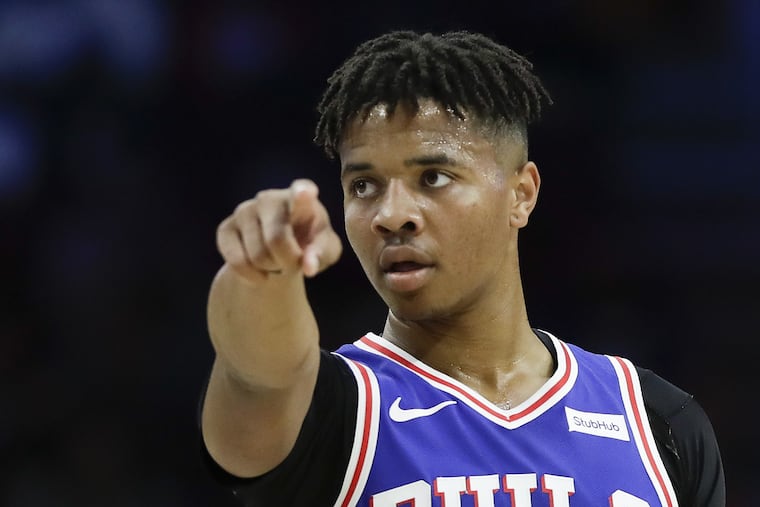Everybody wants what’s best for Markelle Fultz. You just have to hope someone knows what that is. | David Murphy
There are two certainties. One: the Sixers do not understand what, exactly, they are dealing with regard to Markelle Fultz. Two: Fultz's advisors have done him no favors with their latest round of decision-making.

If you came here for certainties, you might be disappointed. By my count, there are two. First, the Sixers do not understand what, exactly, they are dealing with regard to Markelle Fultz. Second, Fultz's advisers have done him no favors with their latest round of decision-making.
That's the extent of the definitive judgments that one can reasonably render regarding the curious case of the kid who, just a year-and-a-half ago, was widely regarded as the most NBA-ready player in that year's draft. Nearly nine months after Fultz returned to the court following an extended absence to treat what was vaguely referred to as a case of "scapular imbalance," and two weeks after Fultz himself insisted that he was not battling any physical ailments that were significantly affecting his play, the shoulder has suddenly reemerged as an issue.
On Tuesday afternoon, the Sixers were at a loss to reconcile those first two scenarios with the phone call they received from Raymond Brothers earlier in the day. Clearly, the conversation with Fultz's agent caught Elton Brand off guard. According to his telling, the agent informed the Sixers' GM that he had advised Fultz to visit a shoulder specialist in New York, and that Fultz would not be playing or practicing until that visit. Brand asked when that visit would occur. Brothers said that it would occur on Monday. Brand said OK.
Once again, the Sixers found themselves in a position of having to explain and defend their handling of a situation that, by all appearances, has defied their comprehension from the beginning.
"I mean, really, it's kind of the first real sort of red-flag-type news" about his shoulder since last year, coach Brett Brown said. "I played him 20-something minutes four days ago and I thought he played OK. In fact, I thought he did well. I think he's having a good year. … And so this news about his shoulder, it did catch me off guard. But if it's that real that he needs to go seek further sort of consultation, then we support him. In my eyes, it's not complicated. Like, that's what it is and we'll support him."
>> READ MORE: For the Sixers' Markelle Fultz, another bizarre twist in a saga that is starting to wear thin
Given the number of different doctors who have examined Fultz over the last year-plus, it strains the bounds of credulity to attribute the Sixers' surprise to negligence or ineptitude. Really, there are only three likely scenarios: One, Fultz is dealing with a major shoulder condition that modern medical science is at odds to diagnose and/or treat. Two, Fultz is dealing with a minor shoulder condition that has been treated as extensively as modern medical science will allow, but that continues to impact his play in a more significant manner than the kinesiological consensus would suggest. Three, Fultz is dealing with a condition whose only treatable aspect is his mind's ability to convince itself that his body is healthy enough to perform like the player he and his employer both think he can be.
There is, of course, a fourth potential scenario. It is one that seems unlikely to reflect reality when you consider the way Fultz has carried himself this season, as well as the testimonies of his coach and teammates and general manager. But it's also one that is impossible to ignore, given that the decision to shut Fultz down came barely 12 hours after his coach's decision to keep him on the bench in the second half raised some legitimate questions about his future role in the Sixers' rotation. Nothing about Fultz's demeanor after Monday night's 119-114 win over the Suns suggested that he felt threatened by Brown's decision to go with T.J. McConnell as his backup point guard. He said that, as a competitor, he wanted to be out there playing but that, as a teammate, he was happy that the Sixers played well with McConnell in his stead. By all outward appearances, he was in good spirits when he left the locker room. He did not look or sound anything like a player preparing to respond to adversity by shutting himself down.
>> SIXERS-SUNS: Best and worst awards, Jimmy Butler, Fultz's shoulder saga
But if it wasn't Fultz, then whose call was it? That question should concern anybody who wants nothing more than to see this kid beat this thing that he is battling. Whether Fultz's problem is in his shoulder, or his head, or some combination of the two, finding a solution will require a greater level of clarity than that which led to the decision to pull him off the court so shortly after his demotion against the Suns. The fact that Fultz was in the gym practicing with his teammates on Tuesday afternoon — this, according to the Inquirer's Keith Pompey — raises further questions about who is behind the wheel of the USS Markelle.
"We've been aligned, we've allowed Markelle to see many specialists at our recommendation and Raymond's recommendation," Brand said. "Raymond's job is different than my job. Raymond's job is to do what he thinks is best for his client. My job is to continue our positive trend and try to get deeper into the playoffs. So I think at the end of the day, we all want to support Markelle. We all want what's best for Markelle."
Count that among the certainties, too. Everybody wants what's best for Fultz. You just have to hope that there is actually somebody who understands what is best for him. And that their voice is actually heard.